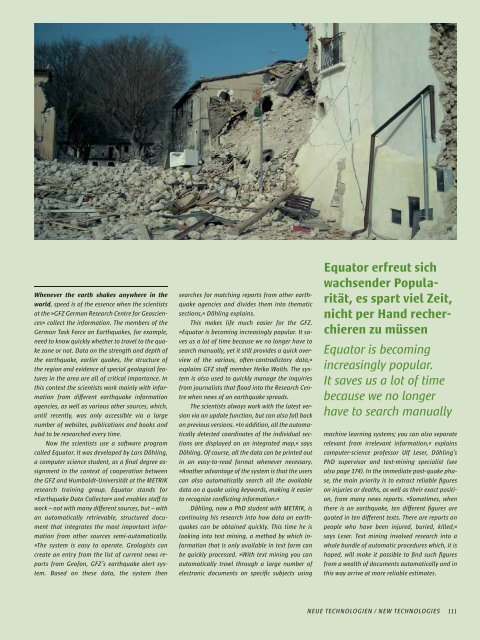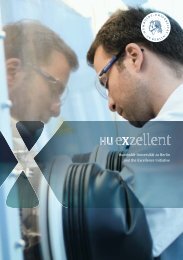hu wissen (pdf) - Exzellenzinitiative - Humboldt-Universität zu Berlin
hu wissen (pdf) - Exzellenzinitiative - Humboldt-Universität zu Berlin
hu wissen (pdf) - Exzellenzinitiative - Humboldt-Universität zu Berlin
Erfolgreiche ePaper selbst erstellen
Machen Sie aus Ihren PDF Publikationen ein blätterbares Flipbook mit unserer einzigartigen Google optimierten e-Paper Software.
Whenever the earth shakes anywhere in the<br />
world, speed is of the essence when the scientists<br />
at the »GFZ German Research Centre for Geosciences«<br />
collect the information. The members of the<br />
German Task Force on Earthquakes, for example,<br />
need to know quickly whether to travel to the quake<br />
zone or not. Data on the strength and depth of<br />
the earthquake, earlier quakes, the structure of<br />
the region and evidence of special geological features<br />
in the area are all of critical importance. In<br />
this context the scientists work mainly with information<br />
from diff erent earthquake information<br />
agencies, as well as various other sources, which,<br />
until recently, was only accessible via a large<br />
number of websites, publications and books and<br />
had to be researched every time.<br />
Now the scientists use a so� ware program<br />
called Equator. It was developed by Lars Döhling,<br />
a computer science student, as a fi nal degree assignment<br />
in the context of cooperation between<br />
the GFZ and <strong>Humboldt</strong>-<strong>Universität</strong> at the METRIK<br />
research training group. Equator stands for<br />
»Earthquake Data Collector« and enables staff to<br />
work – not with many diff erent sources, but – with<br />
an automatically retrievable, structured document<br />
that integrates the most important information<br />
from other sources semi-automatically.<br />
»The system is easy to operate. Geologists can<br />
create an entry from the list of current news reports<br />
from Geofon, GFZ’s earthquake alert system.<br />
Based on these data, the system then<br />
searches for matching reports from other earthquake<br />
agencies and divides them into thematic<br />
sections,« Döhling explains.<br />
This makes life much easier for the GFZ.<br />
»Equator is becoming increasingly popular. It saves<br />
us a lot of time because we no longer have to<br />
search manually, yet it still provides a quick overview<br />
of the various, o� en-contradictory data,«<br />
explains GFZ staff member Heiko Woith. The system<br />
is also used to quickly manage the inquiries<br />
from journalists that fl ood into the Research Centre<br />
when news of an earthquake spreads.<br />
The scientists always work with the latest version<br />
via an update function, but can also fall back<br />
on previous versions. »In addition, all the automatically<br />
detected coordinates of the individual sections<br />
are displayed on an integrated map,« says<br />
Döhling. Of course, all the data can be printed out<br />
in an easy-to-read format whenever necessary.<br />
»Another advantage of the system is that the users<br />
can also automatically search all the available<br />
data on a quake using keywords, making it easier<br />
to recognize confl icting information.«<br />
Döhling, now a PhD student with METRIK, is<br />
continuing his research into how data on earthquakes<br />
can be obtained quickly. This time he is<br />
looking into text mining, a method by which information<br />
that is only available in text form can<br />
be quickly processed. »With text mining you can<br />
automatically trawl through a large number of<br />
electronic documents on specifi c subjects using<br />
Equator erfreut sich<br />
wachsender Popularität,<br />
es spart viel Zeit,<br />
nicht per Hand recherchieren<br />
<strong>zu</strong> müssen<br />
Equator is becoming<br />
increasingly popular.<br />
It saves us a lot of time<br />
because we no longer<br />
have to search manually<br />
machine learning systems; you can also separate<br />
relevant from irrelevant information,« explains<br />
computer-science professor Ulf Leser, Döhling’s<br />
PhD supervisor and text-mining specialist (see<br />
also page 174). In the immediate post-quake phase,<br />
the main priority is to extract reliable fi gures<br />
on injuries or deaths, as well as their exact position,<br />
from many news reports. »Sometimes, when<br />
there is an earthquake, ten diff erent fi gures are<br />
quoted in ten diff erent texts. There are reports on<br />
people who have been injured, buried, killed,«<br />
says Leser. Text mining involved research into a<br />
whole bundle of automatic procedures which, it is<br />
hoped, will make it possible to fi nd such fi gures<br />
from a wealth of documents automatically and in<br />
this way arrive at more reliable estimates.<br />
NEUE TECHNOLOGIEN / NEW TECHNOLOGIES<br />
111



